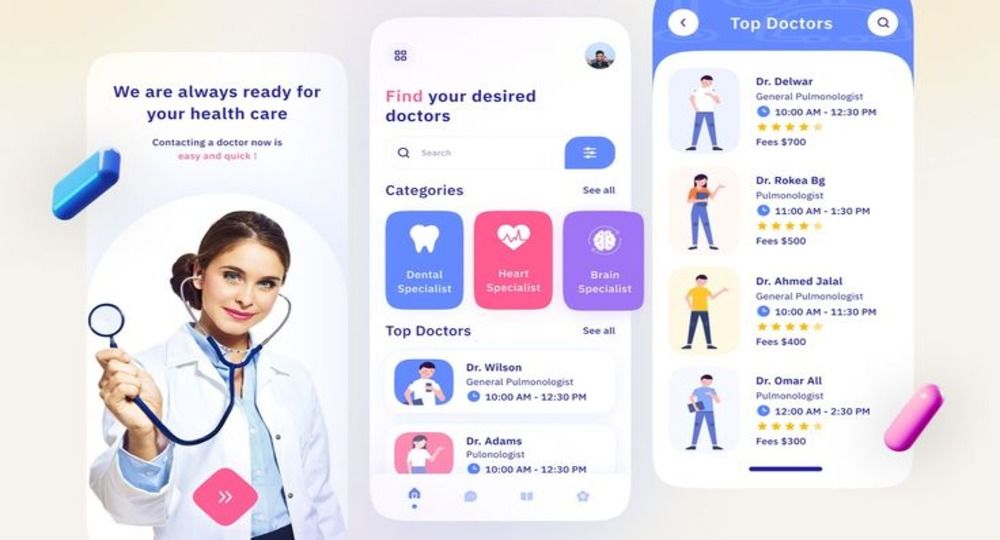The Future of Healthcare: Why Clinics Required a Mobile App Today
As the healthcare landscape continues to develop, centers encounter mounting stress to adapt to person assumptions for better ease and ease of access. The integration of mobile applications can serve as a vital strategy for improving patient engagement and improving operations.
Transforming Person Assumptions
As the landscape of healthcare advances, person expectations are undertaking a considerable change. Today's people are progressively looking for comfort, ease of access, and individualized treatment.
Furthermore, individuals are becoming much more notified and empowered, often researching problems and therapies online prior to appointments. This heightened understanding is combined with a need for openness in medical care procedures, consisting of cost estimates and treatment choices. Because of this, suppliers are obliged to adapt by taking on digital tools that boost the person experience.
The expectation for timely and reliable interaction has never been higher, with lots of individuals taking into consideration responsiveness a crucial element of quality care. mobile app for clinics. In this progressing landscape, medical care companies need to identify these altering expectations and leverage mobile applications to foster a more patient-centric approach, ensuring that they not only fulfill however surpass the requirements set by today's informed customers
Enhancing Person Involvement

Mobile applications promote communication between individuals and healthcare carriers, enabling real-time visit organizing, reminders for medicine adherence, and straight messaging attributes. These functionalities not only enhance comfort yet also develop a feeling of liability among patients. Moreover, mobile applications can offer educational content tailored to private requirements, assisting individuals much better recognize their problems and therapy options.
The integration of gamification aspects within healthcare applications can likewise motivate people to engage in healthy and balanced actions, enhancing positive lifestyle adjustments. Ultimately, improving individual engagement through mobile applications leads to boosted wellness results, greater individual complete satisfaction, and a more collaborative medical care experience.
Enhancing Clinic Workflow
Simplifying center procedures is vital for enhancing process performance and enhancing person care. The application of mobile applications can significantly minimize management concerns, permitting doctor to focus a lot more on person interactions. By automating visit organizing, patient check-ins, and invoicing procedures, facilities can minimize wait times and enhance general functional effectiveness.
Mobile apps also assist in real-time accessibility to patient documents, allowing medical care experts to make enlightened choices quickly. This immediacy not only enhances the quality of care however additionally lowers the likelihood of errors associated with misplaced or outdated information. Moreover, leveraging mobile innovation sustains a much more orderly technique to taking care of person follow-ups and treatment strategies, guaranteeing that no important actions are ignored.
This permits for timely replenishment and aids avoid disturbances in patient care due to equip shortages. By integrating these performances right into their everyday operations, centers can create an extra reliable and cohesive setting, eventually leading to improved person outcomes and complete satisfaction.
Improving Interaction Channels
Efficient interaction is often pointed out as a cornerstone of high quality health care distribution. In today's fast-paced medical environment, mobile applications can substantially enhance interaction networks between centers, people, and healthcare service providers. By integrating mobile applications into their operations, facilities can facilitate real-time communications, making certain that patients get timely info regarding their visits, test results, and treatment plans.
Mobile applications additionally empower clients to interact straight with their healthcare teams through safe and secure messaging features. This direct line of communication promotes a sense of engagement and allows for instant clarification of worries, which can lead to much better adherence to treatment protocols. Press alerts can advise individuals of upcoming consultations or drug routines, minimizing no-show rates and improving overall wellness end results.

Remaining Competitive in Health Care
In a swiftly progressing healthcare landscape, companies must focus on development and versatility to keep an one-upmanship. The assimilation of mobile applications into health care solutions is no more optional; it is necessary for facilities aiming to improve individual involvement, find this improve procedures, and improve general solution distribution.
As patients progressively count on digital platforms for wellness monitoring, facilities that stop working to adopt mobile modern technology risk falling back. A properly designed mobile application can offer features such as consultation scheduling, telemedicine assessments, and accessibility to clinical records, supplying clients with ease and promoting commitment.

Competitors are also purchasing mobile solutions, so remaining in advance needs continuous enhancement site web and staying educated regarding technical innovations. Clinics must not just execute mobile applications but additionally participate in normal updates and refinements. Inevitably, the successful assimilation of mobile innovation will differentiate forward-thinking healthcare companies and established the criteria for patient-centric treatment in a digital globe.
Verdict
To conclude, the assimilation of mobile applications in clinics is essential to attend to the progressing landscape of patient expectations. By boosting patient interaction, streamlining operations, and boosting communication channels, centers can significantly increase wellness end results. Additionally, the adoption of mobile innovation placements clinics to stay affordable in an increasingly digital health care atmosphere. Inevitably, the critical implementation of mobile apps represents a crucial step toward providing accessible and personalized healthcare, thus satisfying the requirements these days's equipped individuals.
Ultimately, enhancing patient involvement with mobile applications leads to enhanced health end results, higher client fulfillment, and an extra collaborative medical care experience.Mobile applications also facilitate real-time access to client records, allowing healthcare specialists to More Help make educated decisions promptly. In today's hectic medical setting, mobile applications can considerably enhance communication channels in between clinics, people, and health care companies.Mobile applications likewise encourage individuals to communicate directly with their health care teams via protected messaging attributes. Eventually, the strategic application of mobile applications represents a crucial action towards providing tailored and available medical care, thereby fulfilling the requirements of today's equipped individuals.